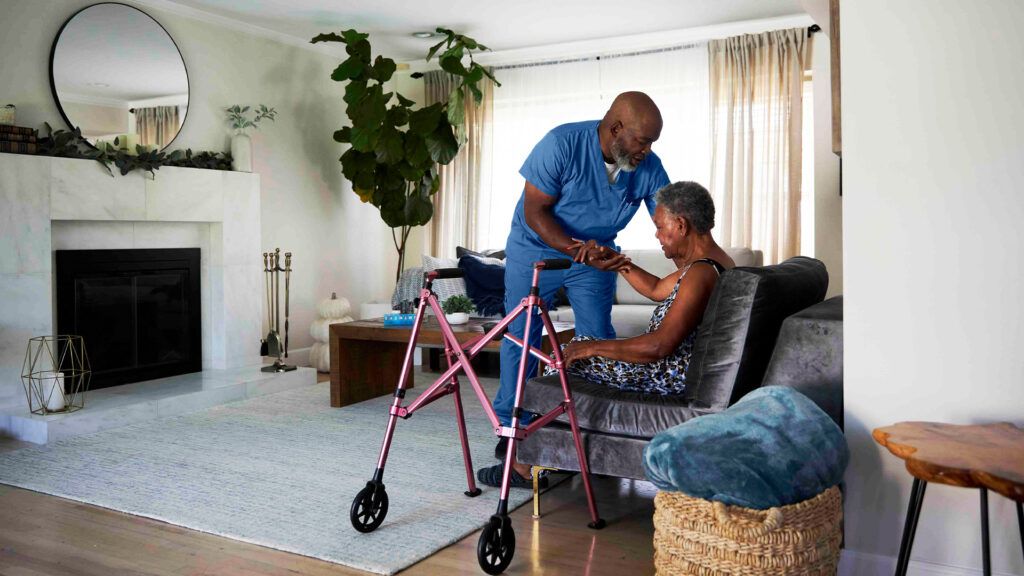Medicare covers home health services. Depending on the circumstances, Part A or Part B provides coverage. However, beneficiaries must meet eligibility criteria.
Home health primarily involves helping a person receive care in their own home instead of the hospital when it is appropriate.
In many cases, home health costs less and is just as effective as care that a person may otherwise receive in a skilled nursing facility (SNF) or hospital.
For Medicare to pay for home healthcare, a Medicare-certified home health agency must provide the service. People who receive services from a noncertified home health agency will need to pay the costs out of pocket.
Glossary of Medicare terms
- Out-of-pocket cost: This is the amount a person must pay for care when Medicare does not pay the total amount or offer coverage. Costs can include deductibles, coinsurance, copayments, and premiums.
- Premium: This is the amount of money someone pays each month for Medicare coverage.
- Deductible: This is an annual amount a person must spend out of pocket within a certain period before Medicare starts to fund their treatments.
- Coinsurance: This is the percentage of treatment costs that a person must self-fund. For Medicare Part B, coinsurance is 20%.
- Copayment: This is a fixed dollar amount a person with insurance pays when receiving certain treatments. For Medicare, this usually applies to prescription drugs.

Medicare covers a variety of home health services for as long as it is reasonable and deemed medically necessary to treat an injury or illness.
Medicare covers up to 8 hours of care a day for a maximum of 28 hours a week. For some people, the insurance program pays for up to 35 hours a week of home health. Medicare assesses the need for 35 weekly hours of care on a case-by-case basis.
Rehabilitation therapy
Rehabilitation or skilled therapy services help individuals regain daily function and improve their ability to live independently every day.
These services may include:
- Physical therapy: This includes gait training, supervision of exercises, and training to regain strength and movement in the affected area of the body.
- Occupational therapy: This helps a person to regain the ability to perform typical daily activities on their own, such as getting dressed and eating.
- Speech therapy: This helps a person to strengthen and regain speech and language skills.
Medical supplies and equipment
Medicare Part B covers certain medical supplies that are necessary for home health services. These are known as durable medical equipment (DME).
A doctor must prescribe the equipment and deem it medically necessary for Medicare to provide coverage.
Medical supplies and equipment that Medicare covers may include:
- canes
- infusion pumps
- walkers
- wheelchairs
- hospital beds
- blood sugar testing strips and monitors
- nebulizer equipment
- traction equipment
- wound dressings and supplies
Medicare covers the cost of medical equipment for home use in a few different ways, depending on the type of supplies or equipment.
For example, Medicare pays rental costs for certain types of equipment. Individuals may choose to buy the equipment, in which case, Medicare also covers the cost.
Read more about Medicare coverage for medical devices.
Medical social services
If a healthcare professional or other provider feels an individual may need extra help with emotional or social concerns that may interfere with treatment and recovery, Medicare may help cover the cost of these social services.
These services might include finding help in the community and counseling.
However, Medicare will not cover these services unless the individual is also receiving some type of skilled care.
Skilled nursing care
Medicare Part A also covers the provision of skilled nursing care through home health if it is intermittent or part-time.
Intermittent nursing involves under 8 hours of care a day for 21 days or, in some circumstances, up to 35 days. It can also refer to nursing care that a person receives on fewer than 7 days of the week.
Medicare does not cover skilled nursing care that requires more than 8 hours a day or is not intermittent.
A registered nurse or licensed practical nurse must provide skilled nursing during home health services for Medicare to pay. Home health skilled nursing care may include:
- wound care and dressing changes
- tube feedings
- administering intravenous (IV) drugs
- education in disease management
Home health personal care
Home health aides provide personal care, such as help dressing and bathing.
Medicare only pays for a home health personal care aide when an individual also receives skilled nursing care or rehabilitation services through home health. Medicare does not cover home health personal care aides as a stand-alone service.
Read more on Medicare nursing home care coverage.
Medicare does not cover all home health services. Exclusions include:
- meal delivery
- household services, such as cleaning and shopping
- personal care, such as bathing, without the need for skilled nursing care
- 24-hour care in the home
Medicare also does not cover certain services, such as foot care, regardless of whether they involve home healthcare.
Medicare beneficiaries who meet certain criteria can qualify for home healthcare under Medicare Part A and Part B.
To qualify for services, requirements include the following:
- Individuals must be enrolled in Original Medicare (Part A and Part B).
- The treating doctor must certify that the beneficiary needs one or more of the following:
- physical therapy
- occupational therapy
- speech therapy
- intermittent nursing care
- A Medicare-approved home health agency must provide the care.
- Skilled nursing care is only intermittent or part-time.
- The beneficiary is unable to leave their home.
The treating doctor must certify that the beneficiary is homebound. The criteria for being homebound include not being able to leave home without a wheelchair, walker, or special transportation due to an injury or illness.
If a doctor recommends that a person remain home due to a medical condition, Medicare will also consider a person homebound.
Read about Medicare eligibility.
People with Original Medicare pay $0 for home health services. Unlike inpatient hospital stays, there are no copayments or deductibles for home healthcare.
However, one exception applies. People with Medicare pay 20% of the Medicare-approved cost for necessary medical equipment and supplies, such as a wheelchair, cane, or walker.
Medicare only covers care from one Medicare-approved home health agency at a time. It does not cover care that a person receives from two or more home health agencies at the same time.
Usually, before the start of care, a home health agency informs the beneficiary of how much Medicare will cover and the remaining costs that they will need to pay.
This way, Medicare recipients understand their out-of-pocket expenses and responsibilities before any services start.
The home health agency provides a verbal and written explanation of costs called the Advance Beneficiary Notice. In some states, a home health agency may request a review by Medicare to confirm the coverage of services.
This notice allows both the agency and Medicare beneficiary to confirm coverage and set expectations early on in the process.
Find out about Medicare’s other out-of-pocket costs.
Medicare resources
For more resources to help guide you through the complex world of medical insurance, visit our Medicare hub.
Medicare Part A and Part B cover different aspects of home healthcare. Part A covers rehabilitation therapy and skilled nursing care. Part B covers medical equipment and necessary supplies.
People who qualify for parts A and B may receive home health coverage. However, they must also meet certain criteria, including needing rehabilitation therapy or skilled nursing care on a short-term basis to treat an illness or injury and being homebound.
A 20% coinsurance applies to necessary medical equipment. The care provider will alert the person receiving these services to any outstanding costs before treatment starts.


